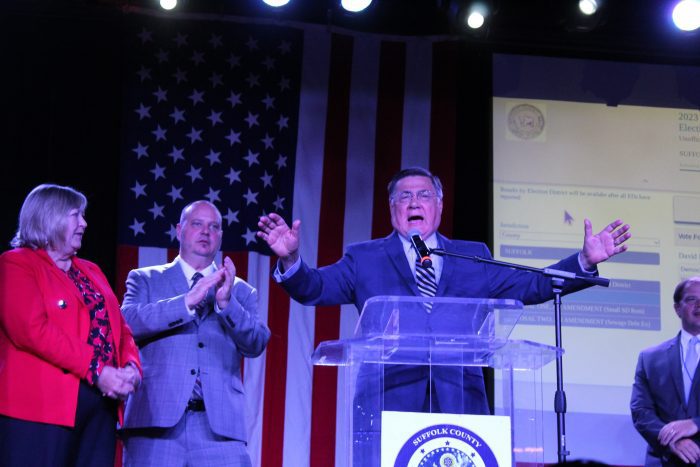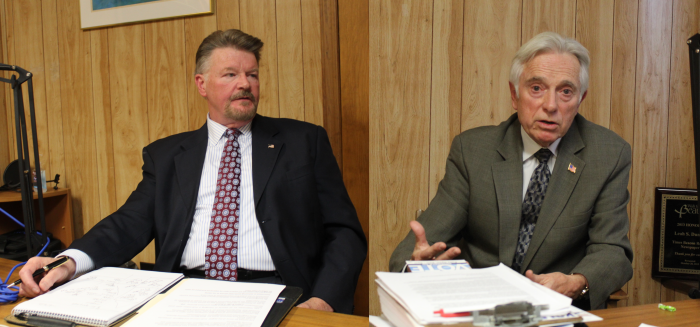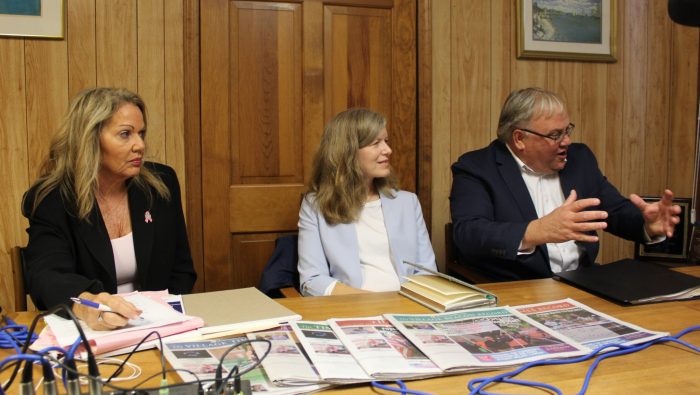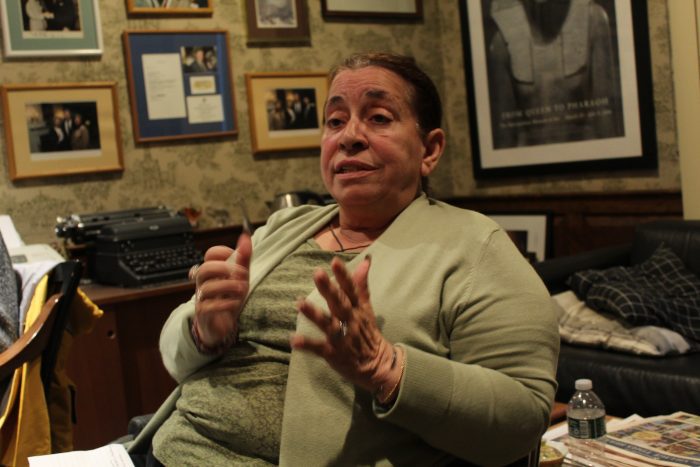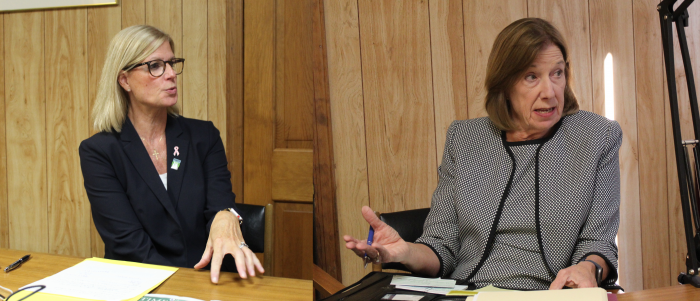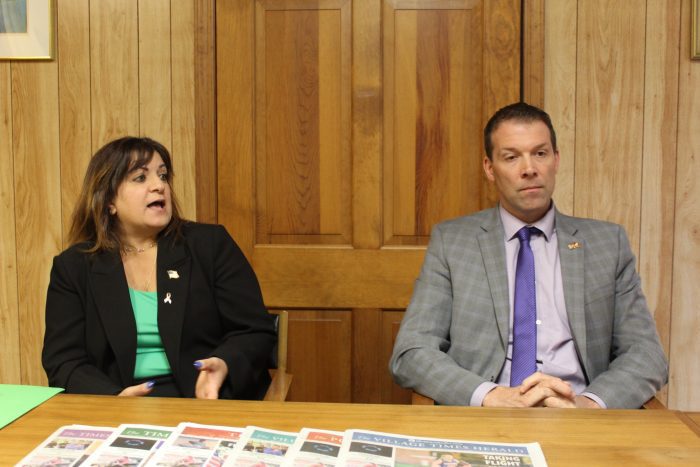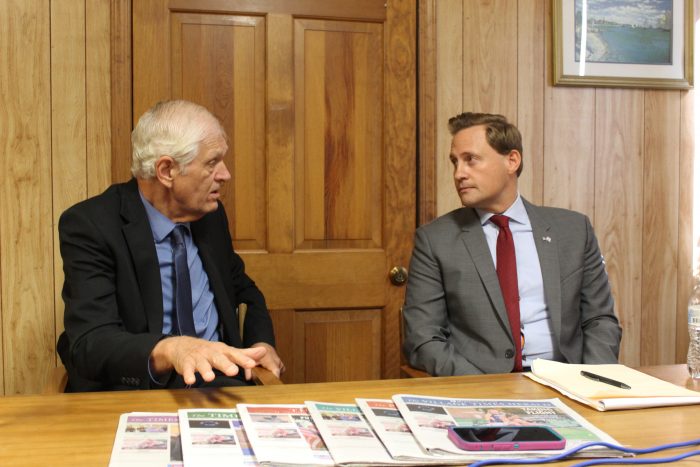Two lawyers are vying to succeed incumbent Suffolk County Legislator Sarah Anker (D-Mount Sinai) who is term limited.
Dorothy Cavalier (D-Mount Sinai), Anker’s chief of staff, is running to fill her boss’ seat against Chad Lennon (R-Rocky Point), a congressional aide to U.S. Congressman Nick LaLota (R-NY1).
In a debate at the TBR office spanning over an hour and a half, the two candidates presented their respective visions for the county’s 6th Legislative District, which covers the Town of Brookhaven’s northeastern hamlets from Mount Sinai to Wading River, extending as far south as Middle Country Road.
Introductions
Cavalier has been a practicing attorney for two-and-a-half decades, working across the legal spectrum in such areas as personal injury, criminal defense and family law, among others. She was a traffic court prosecutor before entering Anker’s office in 2019.
Since entering county government, she said she has worked at “handling every aspect of the office,” from staff management, constituent services, drafting resolutions, reviewing the budget and advising the incumbent.
“I’m running for this seat because, for me, this is the next logical step,” she said. “I’ve come to love the job that I’m doing. I want to continue taking care of the constituents in the community that I raised my kids in and that I love.”
Lennon is a major in the U.S. Marine Corps Reserve. He did four years of active-duty service, with combat deployment to Afghanistan, where he led over 50 combat missions.
In his professional life, he is an attorney at Tully Rinckey, specializing in military law, veterans law, security clearance representation and federal employment law.
“It’s all about service for me,” he said. “I’ve been doing it for 15 years and want to continue to do it.”
Wastewater
This year’s 6th District election comes at a time of countywide contention over the future of its wastewater infrastructure. Earlier this year, Republicans in the county Legislature blocked introducing a 1/8-penny sales tax to the November ballot, which, if passed, would have created a fund for innovative/advanced septic systems and sewers.
Lennon pointed to perceived deficiencies within the Water Quality Restoration Act, contending that too small a share of the revenue would have supported sewers.
“Right now, the problem is that three-quarters of that money is going to go to IA systems, and one-quarter is going to go to sewer systems,” he said. “We have hundreds of millions of dollars in shovel-ready projects to get sewer systems. That’s going to create more jobs, cleaner water and more affordable housing.”
Responding, Cavalier said she believed the proposed sales tax should have gone out for a public vote this November.
“The one-eighth of a penny in increased sales tax I don’t think is a burden,” she said. “It’s something that we should have given the people a choice on, whether to do that or not. Really, they just took the choice away from the people.”
She added that sewers are “not going to be a viable option” for much of the county, maintaining that IA systems are more likely to be implemented within the 6th District as well.
Economic development
Throughout the 6th District, commercial corridors are increasingly experiencing vacant storefronts and economic stagnation. Asked for the mechanisms the county can use to introduce public investment into struggling commercial districts, Cavalier touted the work she has done within the district office.
“We’ve worked with the Department of Economic Development and created a small business website so people interested in small business” can access grants and learn to finance their small business operations.
She advocated for creating a county department for prospective small business owners, who can receive advice to help tailor their business plans.
“I think we need to do more than just a job fair,” she said, saying the county could assist entrepreneurs by getting them on their path toward opening a business.
Lennon advocated hardening the built environment across commercial districts such as Sound Beach and Rocky Point, which he said are susceptible to flooding.
“Right where those downtown areas are, they can be really affected by four weekends in a row of heavy rain,” he said. “That could affect the businesses because if they get flooded, they get ruined, and when one business goes in that downtown district, it can have a cascading effect.”
Along with infrastructure improvements, he said the county must establish incentives not merely to introduce new businesses but to encourage them to stay in the area.
“We need to make sure that we incentivize businesses to stay with us,” Lennon said, endorsing the suspension of the county energy tax, which can eat away at proprietors’ bottom lines.
Affordability
The county is also experiencing a regional flight of seniors and young people who are becoming priced out due to the high cost of living.
Lennon identified several tax categories he would “suspend right away,” such as energy, mortgage, gas and some property taxes.
“We need to look at our first responders, such as our firefighters, and see if we can give them some type of incentive to stay here as well as our parents and grandparents — anyone 70 years and above,” he said.
Cavalier said the county could support seniors and youth by promoting affordable housing investments. “I think that we really need to take a look at how to make it more affordable for our children, our seniors and for our veterans to stay here and retire here,” she noted.
The Democratic candidate also cited vacant strip plazas as a possible destination for mixed-use redevelopment. “We have a lot of commercial buildings and office space that maybe we can consolidate,” she suggested. She added that cutting back existing taxes and reinstituting the county’s task force for retired veterans are necessary policy solutions.
Pedestrian safety
Cavalier suggested a civic-oriented approach to identifying areas for new sidewalk projects. She prided herself on the North Shore Rail Trail, noting that pedestrian safety along the trail remains a continual work in progress.
She suggested that state Route 25 and pockets along 25A have created a public safety hazard. She backed “working with [New York State] to try to get a light on 25A” to stop the speeding from Oakland Avenue to Miller Place Road.
Lennon supported greater coordination between the county and the Brookhaven Highway Department to construct new sidewalks and expand bike lanes.
“The problem that we have is that a lot of the main roads are state owned, and to get anything changed — for instance, having traffic lights put up — the state has to come in, recommend a study and do a change,” he indicated. “The state’s not even coming in right now, so we need to work with our state partners in the Assembly and the Senate.”
Veteran services
The 6th District is unique for its concentration of veterans. An area of focus for Lennon, he outlined a multipronged vision for bringing more veterans in touch with the existing benefits available to them. “The biggest thing is information,” he said. “Who do I speak to, and how do we get it to them?”
He noted that introducing veterans to union jobs and enrolling them in college programs on Long Island would be steps in the right direction.
To continue to support the veterans within the district, Cavalier said the county could lend a hand in coordinating with veterans groups and creating housing opportunities for homeless veterans.
She said there are various services and programs tailored for veterans that many do not realize exist. “We really need to not only strengthen those services, but we need to get the information out there that they exist,” she said.
Quality of life
Cavalier identified public safety as a top quality-of-life concern for 6th District residents. She expanded those public safety concerns to fears over environmental degradation and roadway safety. Summarizing her local priorities, she said, “For me, it’s public safety, it’s affordability and it’s traffic safety.”
Lennon agreed with Cavalier on public safety and the cost of living in the area. But he cited the ongoing migrant crisis within New York state as problematic for Suffolk County.
“We don’t have the infrastructure” to support new migrants, he said, identifying potential shortages of teachers and a lack of available resources. “You can’t just say we’re going to dump hundreds if not thousands of people into this county and think it’s going to be successful.”
District 6 voters will have the final say on these two candidates. Election Day is Tuesday, Nov. 7.






















































